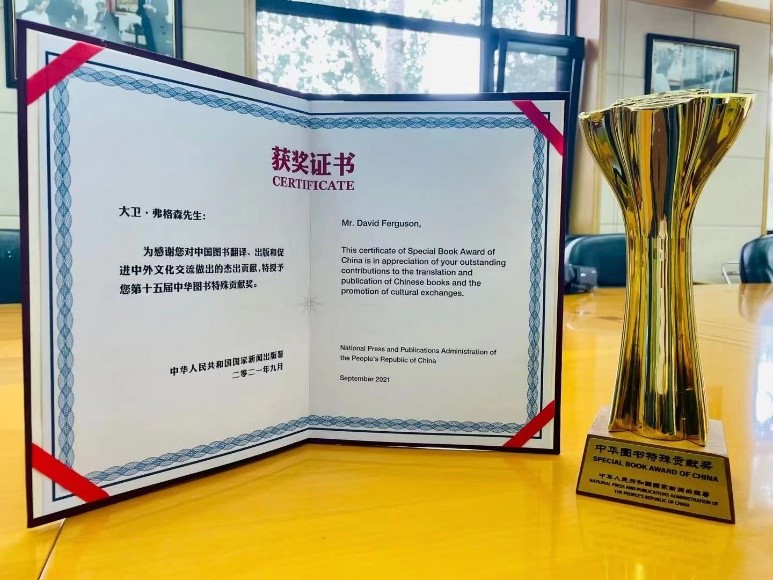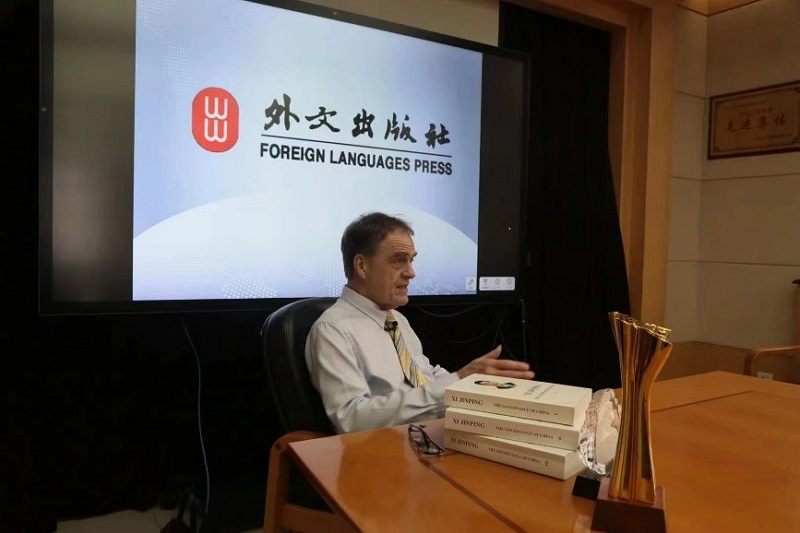The Scot Who Defends China

China is huge, China has 5,000 years of civilization, dozens of provinces, there are vast numbers of stories to be told. I think it’s more about the style of storytelling to make it appealing to non-Chinese readers.
On September 30, David W. Ferguson posted a message for his mother on his WeChat Moments, the most popular social networking platform in China, along with a photograph of himself wearing his kilt. The message said, “I’m on the telly, Mum!”
He had good reason to feel thrilled. On that day, the 65-year-old Scottish received the Chinese government’s Friendship Award – China’s highest honor for a foreigner – from Vice Premier Liu He at the Great Hall of the People in Beijing. Every year, around 50 foreign experts receive the award at a grand ceremony in recognition of their contribution to promoting exchanges between China and other countries.
Good news comes in pairs. Just a fortnight before, he had been awarded the 15th Special Book Award of China for his contribution, including his work as an editor of Xi Jinping: The Governance of China, the English version of the compilation of President Xi’s speeches, letters and other writings.

It all started in 2008
Born and brought up in Scotland, Ferguson had little idea about contemporary China except for the stereotype of a backward country ruled by a communist party. It was only after he met Li Muqun, who had come from China to study in the U.K., that he came to know more about the remote country. They fell in love, got married, and then decided to go to China to try their luck.
Ferguson was a law school graduate, but never practiced law. After coming to China in 2006, he tried many jobs in Jilin, the province in northeast China that was his wife’s hometown. First he worked as a football agent, then as a management consultant. But neither really worked out. So after two years, in early 2008, he took his wife’s advice to apply for a position as journalist and editor at China.org, an official portal on news, happenings and analyses about China.
At first, he had misgivings about working for an organization that was associated with the Chinese Government. However, in March 2008, when violent riots shook Tibet Autonomous Region, Ferguson changed his mind. When he read Western media reports and Chinese media reports on the violence side by side, he found he was “looking at two completely different stories of what actually happened,” and “the Western media story was a pack of lies.” He did some research and was shocked.
“It got to the stage where I became quite angry,” he says. “And I decided to take the job with China.org. Fundamentally, I decided that having seen what the Western media was doing to China, at least some person should do better and try to tell honest stories about China.” So he began his career as an English journalist based in Beijing. Since then, he has been a defender of China against biased and false news by Western media.

It’s the style that really matters
Currently, Ferguson is a writer and editor with Foreign Languages Press, a sister organization of China.org, where he edits books on China’s politics, economy and culture. After years of editing, he has realized that the Chinese discourse is entirely different from the Western, and explaining China’s true achievements is no easy job.
“Normally, Chinese politics talks more abstract concepts than Western politicians do. Chinese books are full of data and theory. To read them is hard work.”
One of the books he edited was on Gu Wenchang, a model member of the Communist Party of China who dedicated his life to alleviating poverty on a barren, unproductive island in Fujian Province in southeast China. He focused on greening it, convinced that if he could grow trees or plants there, it could be made fertile. It took him decades, but eventually he succeeded and Dongshan Island today is a beautiful place. Gu succeeded in transforming the island into an oasis of green.

Ferguson was deeply impressed by the book. He found the story genuine and touching. He writes books about China too. “There are so many fascinating stories when I go to places,” he said. “China is huge, China has 5,000 years of civilization, dozens of provinces, there are vast numbers of stories to be told. I think it’s more about the style of storytelling to make it appealing to non-Chinese readers.” How to tell good stories about China? He holds up President Xi as an example.
He says that when he is addressing an audience, Xi adapts his speeches to their needs. Ferguson worked on a book of articles written by Xi from 2003 to 2007 when he was the Party secretary of Zhejiang Province in east China. Back then, Xi used to write one or two articles a week for Zhejiang Daily.
“You can see in the articles what becomes Xi’s thoughts on socialism with Chinese characteristics. You can see the ideas forming. He expresses them very well. He writes short articles, expresses things simply. He seldom repeats himself.”
Ferguson has been living in China with his wife and son for almost 16 years and the country has become part of him. He hopes to present this real, dynamic, and modern China to more people through his books.
 Facebook
Facebook
 Twitter
Twitter
 Linkedin
Linkedin
 Google +
Google +










